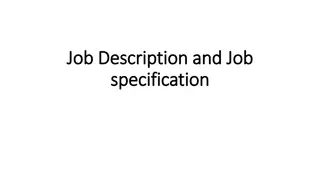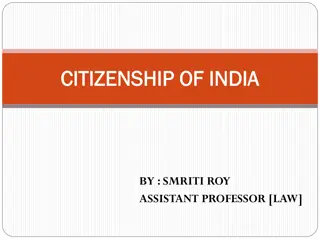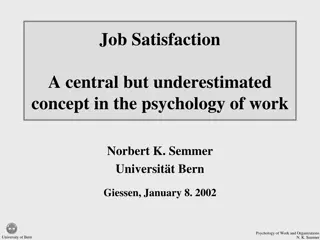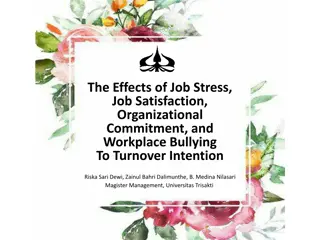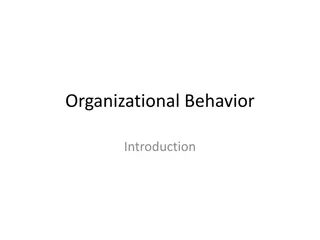Impact of Job Satisfaction on Organizational Citizenship Behavior in IT Users: A Study in Poland
The study explores how professional position and life satisfaction affect organizational citizenship behavior (OCB) among IT users in Poland, focusing on supervisors and subordinates. It examines the dimensions of OCB and the role of job satisfaction in promoting ethical behavior within organizations. Job satisfaction is linked to improved performance and commitment among workers, leading to organizational success.
Download Presentation

Please find below an Image/Link to download the presentation.
The content on the website is provided AS IS for your information and personal use only. It may not be sold, licensed, or shared on other websites without obtaining consent from the author.If you encounter any issues during the download, it is possible that the publisher has removed the file from their server.
You are allowed to download the files provided on this website for personal or commercial use, subject to the condition that they are used lawfully. All files are the property of their respective owners.
The content on the website is provided AS IS for your information and personal use only. It may not be sold, licensed, or shared on other websites without obtaining consent from the author.
E N D
Presentation Transcript
Faculty of Historical and Pedagogical Sciences Institute of Psychology, Poland , Title: Do Satisfied IT users - supervisors and subordinates manifest organizational citizenship behaviour at work? Possible applications in engineering studies programs MACICT Project 2018-2022 Alicja Keplinger, University of Wroclaw, Poland Jolanta Kowal, University of Wroclaw, Poland MACICT Project The workshop presented during the INternational Conference ICTM 2019 and during the 2nd MACICT Meeting Wroc aw, 23-25 October 2019
The Goals of This Study The aim of the article is to describe how professional position and level of life satisfaction (LS) affect organizational citizenship behavior (OCB) among IT users in Poland, the country which is an example of a transition economy. . The dependent variable is OCB containing two dimensions: interpersonal orientation (OCBI) and organizational orientation (OCBO). Two independent qualitative variables were distinguished: professional position (supervisor - Psup, subordinate - Psub) and life satisfaction (LS) - satisfaction from personal life (SPL) and satisfaction of job (SJ). It is assumed that satisfied IT users - supervisors and subordinates percept and manifest organizational citizenship behaviour at work.
Overview 1. Introduction 2. Satisfaction 3. Ethical behavior Organizational Citizenship Behaviours (OCB) 4. Position 5. IT Users 6. Research Questions and Hypotheses 7. Methodology 8. Results 9. Discussion 10.Conclusions 11.Limitations and Directions for Future Research 3
Introduction Much of the blame for the economic downturn occurring over the past several years has centred around organizations plagued by unethical leadership and behaviours. (Kacmar, K.M., Andrews, M.C., Harris, K.J., Bennett J. Tepper, B.J., 2013). As a result, both supervisors and subordinates employed have demonstrated a strong interest in promoting ethical behaviour in organizations. (Kacmar, K.M. et al., 2013; Kowal, J. and Roztocki, N., 2015, Keplinger, A. et al., 2016)
Satisfacion In essence, job satisfaction is frequently defined as the emotional-affective response of the employees to the job (Spector 1985). satisfaction and organisational performance Bakoti , D., 2016, Relationship between job Workers who have a high level of job satisfaction generally love their job; they feel justice in an environment in which they work, and feel that their job gives them some positive features such as variety, challenge, good pay and security, autonomy, pleasant co-workers, etc. Workers who are happy at work will even devote private time to their work activities, they will be creative and committed, they will seek a way to cross any obstacle which might exist in the realisation of their jobs, and they will assist their colleagues and superiors. These workers will have extraordinary performance, and the companies with these kinds of workers will be successful.5
Position Subordinate -An employee ranked below another employee in terms of seniority or office hierarchy. http://www.businessdictionary.com/definition/subordinate.html; 14.10.2019 Supervisor/Superior/Boss - Supervisors are usually authorized to recommend and/or effect hiring, disciplining, promoting, punishing, rewarding, and other associated activities regarding the employees in their departments. http://www.businessdictionary.com/definition/supervisor.html; http://www.businessdictionary.com/definition/boss.html; 14.10.2019 6
Ethical behavior OCB: Organizational Citizenship Behavior OCB - behaviour, which is not covered by the formal job description, but usually facilitates the realization of tasks and support in enhancement of these behaviours in organizational settings. OCB-I behaviour directed at specific individuals in the organization, such as courtesy and altruism is not explicitly or indirectly recognized by the formal reward system plays a vital role in the effective functioning of the organization (Organ, 1988) OCB-O behaviour benefiting the organization without actions aimed specifically toward any organizational member or members. This behaviour includes: giving prior notice regarding an absence from work or informally adhering to rules designed to maintain order. Sources: Anderson, Williams, 1998, Bateman, Organ, 1983; Lee, Allen, 2002; Konovsky, Organ, 1996, Organ, 1997; Organ, Podsakoff, Mackenzie, 2006; Schnake, 1991, Keplinger et al., 2014; Kowal, Keplinger, 2015. 7
IT users definition work a minimum of 20 hours per week can skillfully use hardware and software (created by the IT professionals) but they do not create systems and programs themselves (Keplinger et. al 2014, Kowal & Keplinger 2015). 8
Fig. 1. Research Framework Model And Hypotheses H1: There are the dependencies between global life satisfaction, position (superiors and subordinates) and OCB among IT users. H2: Job satisfaction of IT users has an effect on the levels of the OCB (OCB-I and OCB-O). H3: It can we observed the impact of the interaction between professional position and job satisfaction on OCB (OCB-I and OCB-O). JS can be the moderator of relations: Position - OCB 10
Methodology Tools adaptations of two questionnairs: OCB (OCBI and OCBO) dependent variables Life Satisfaction questionnaire (Job Satisfaction, and Individual private Life Satisfaction) independent variables, moderators Position independent variable Sample construction Statistical methods Questionnaires adaptation 11
Table 1. Items for Organizational Citizenship Behaviours (OCB) 12
Table 2. Items for Life Satisfaction (LS) (Adapted from Anke, and Fugl-Meyer (2003) and from Diener, Emmons, Larsen, & Griffin (1985) JS LS 13
Sample Characteristics of IT Users in Both Countries Participants and data collection. The trials construction included the methods of random interpersonal network and sequence sampling with the passive optimal experiment design in Poland (Kowal and Keplinger 2019). The study was carried out in 2016-2019 in a group of 280 IT Users in Poland. The research was conducted by means of an online survey based on our own adopted tools: The OCB Questionnaire and The Life Satisfaction Questionnaire. Quantity Percent Category Supervisor Subordinate Total 91,00 189,00 280,00 32,50 67,50 100,00
Statistical methods For all questions measuring LS was applied from the 5- point Likert scale: 1 means I strongly disagree, and 5 I strongly agree. For all questions measuring OCB was applied from the 4-point Likert scale: 1 - She/ he completely is not like that, 2 - She/ he is not like that, 3 - She/ he is like that, 4 - She/ he is so completely. The statistical methods were chosen appropriately to measuring variables scales. They comprised the descriptive statistics, the point estimation, the section estimation, the statistical hypotheses verification and multivariate analysis as ANOVA, CFA, EFA, AVE, SEM. MANOVA, multivariate analysis of variance, regression approach. 15
The adaptation process
OCB, Global Model Scales Discriminant Power (AVE, EFA), Reliability (Cronbach s ) Analysis, and Validity (CFA) Analytical methods used in the process of validation comprised the method of competent judges, items discriminatory power, scales validity (CFA) and reliability (Cronbach s ) analysis.To measure the discriminant validity of the construct the authors apply the Average Variance Extracted (AVE) method, in order to examine whether the amount of variance explained by the construct in relation to the amount of variance due to the measurement error is significant. The conceptual model was confirmed by SEM analysis. 17
The correlations concerning sample of IT Users in dimensions of OCB (OCBI, OCBO), Position, Satisfaction (JS, LS) (significance with p<0.05) Independent variables Position Job satisfaction Individual life satisfaction Global life satisfaction (JS+Lslife) INT_POS_GLLS - interaction of position and global life satisfaction INT_SJOB_POS - interaction of position and job satisfaction INT_LS_POS - - interaction of position and private - individual satisfaction Int_LSJOB_LSLIFE - interaction of job satisfaction and life satisfaction OCBI OCBO OCB 0,10 0,08 0,25 0,24 0,18 0,13 0,28 0,24 0,13 0,29 0,19 0,31 Results 0,25 0,25 0,29 0,21 0,22 0,25 0,18 0,08 0,17 0,27 0,24 0,31
Overview of Results Hypothesis Supported Comments There are the dependencies between life satisfaction, position (superiors and subordinates) and OCB among IT users. 1 Yes Job satisfaction of IT users has an effect on the levels of the OCB (OCB-I and OCB-O). 2 Yes It can we observed the impact of the interaction between professional position and the dimensions of satisfaction on OCB (OCB-I and OCB-O). 3 Yes Our hypotheses concerned with Position, Satisfaction (JS and LS) and OCB (OCBI and OCBO) are confirmed. 19
Conclusion 1 Both superiors and subordinates assess each other similarly manifesting OCB, OCBI and OCBO at a medium high level. in terms of 20
Life satisfaction, position and OCB Satisfied subordinates who see that their superiors are demonstrating OCB, they tend to behave similarly. It can be concluded that they take the example from superiors. Conclusion 2 In the group of superiors, life satisfaction differentiates the overall level of OCB and OCBI but does not determine the level of OCBO. More subordinates civic behaviour, especially those oriented to on people, for example, mutual help. satisfied from life, superiors see on their Our research reveals a lack of relationship between the satisfaction of superiors' life and their perception OCBO among subordinates 21
Job satisfaction, position and OCB The superiors in our group are moderately satisfied with their work. People dissatisfied with work did not appear among the superiors. Most subordinates are moderately satisfied with their work. In the group of employees' subordinates there is a similar percentage of dissatisfied and very satisfied employees. Conclusion 3 Levels of job satisfaction of subordinates differentiate their perception of organizational behaviour among superiors in the field of OCB, OCBI, and OCBO. We observed that among promoted people there are no employees who are completely dissatisfied. Among them, the level of satisfaction is at least average. Most superiors obtained a moderately high level of job satisfaction in the study, as did subordinates. Superiors very satisfied with work compared to moderately satisfied more often perceive OCB among their subordinates. 22
Interactions and OCB There is a moderation of the relationship of position and OCB, OCBI and OCBO with regard to job satisfaction. One can observe the impact of the interaction between professional position and job satisfaction on OCB, OCBI, OCBO. The bosses who are very satisfied with their work most often see in their subordinates the manifestations of OCB, OCBI, OCBO. Subordinates with the highest degree of job satisfaction more often see OCB, OCBI, OCBO at their bosses. 4 Conclusions Our research finds that there is significant interaction, and therefore moderation, between the variables: position and life satisfaction with OCBI and OCBO as well as OCB. Compared to all the analyzed groups, bosses achieving a high level of life satisfaction show the highest average of value in perception of OCBI, OCBO also OCB type behaviours in general. It means that for life satisfied bosses the most percept the good examples of behaviour of their subordinates against the background of other bosses. 23
Discussion Our findings are compatible to results of Kowal and Roztocki (2015a, 2016), who claimed that Polish IT professionals are rather pessimistic as far as organizational ethics is concerned and and have reached the low level of trust each other. Similar conclusions were emphasized by Keplinger et el. (2014a), Kowal and Keplinger (2015), who observed rather medium or worse OCB among IT users in Poland. Maybe this pessimistic effect of ethical aspect of behaviour can be related to mobbing and professional burnout of IT users in Poland, concerned with unemployment and uncertainties jobs (Kowal and Gurba 2015, 2016). Generally the evaluation of OCB and its subscales are rather low. Probably it can be caused by the fact that Poland is in transition process from centrally planned economy where usually dominated authocratic leadership or style of management, and OCB don t correlate strongly with moral and ethical aspects in the context of socio-economic processes (Kowal, Roztocki, 2013, 2015, Keplinger et al., 2016). 24
Originality / value The presented research fills a gap in the area of observation and description of the characteristics of IT users who are in the labour market. Research shows the significant role of shaping ethical behaviour in the work environment in the social and economic, especially management human resources context. In the light of our knowledge, the novelty of our research is the achieve interesting result about the bosses who achieve a high level of life satisfaction, and who the most percept good formes of the behaviour of subordinates. In Poland (it means the example of the country of transition economy) this result is important because you find here rather a harsh and impersonal approach to subordinates. Ethical emotions, e.g. satisfaction from life are related to ethical behaviour on a daily basis. 25
Contribution, limitations and next step Contribution: The results of our study may be addressed to users and professionals, especially HR staff, managers in transition economies, teachers. Applying our conclusions may improve social and economic work results. Applying and popularizing the ideas of OCB may be a factor of development of Information System staff because ethical attitudes and behaviors increase: commitment, efficiency, economic growth. We hope that our research presented in this paper will inspire other researchers to conduct their own research on this interesting topic. The limitations of current studies concern: Research should be continued on more numerous people. Studies could be continued in the other transition and developed countries for more numerous research samples. Next step of our research could be the examination of the psycho-social mechanism responsible for ethical aspects of behavior at work. 26
Thank you! We are open for questions Alicja Keplinger Jolanta Kowal alicja.keplinger@uwr.edu.p l jolanta.kowal@uwr.edu.pl 27











